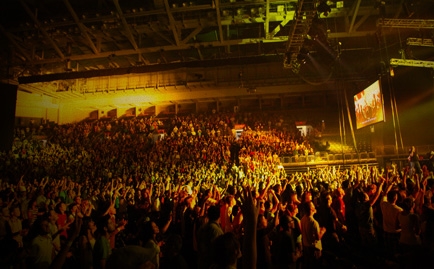Ask many worship leaders what the focus of their worship service is
and they will invariably say something about the presence of God.
“We just want God to show up.”
“We want to make room for God to move.”
“We want to experience the presence of God.”
It sounds so good, so spiritual, so other-worldy that we don’t easily recognize how misguided it is.
Think about it: Is there any doubt that God will be present?
We know from Psalm 139 that God is omnipresent. Moreover, through the
promise Jesus gave in Matthew 18:20, we know that whenever believers
gather—whenever, not just when they sing—God will be there.
The
focus of the Baal-worshipers at Mt. Carmel was to get Baal to do
something, to act on their behalf. The Baal worshipers danced,
chanted, cut themselves, cried out in loud voices, all to coax their
god to make his presence felt. The scary thing is, if you take away the
whole cutting bit, it sounds like a good revival service! Contrast that
scene to the one that follows with Elijah, the prophet of Yahweh. He
simply speaks the word of God.
Of course, there are other
accounts of Yahweh worship that include singing, music, dancing and
other elements of a very multi-sensory experience. And it’s not just in
the Old Testament. The Book of Revelation paints a vivid worship scene
with a tapestry of colors and a symphony of sounds. But the goal of
Yahweh worship is never to make God more present.
So, why do we sing and dance?
Not to coax God into acting. Not to make ourselves feel His presence.
We sing and dance—and all the other physical activities that make our
worship “multi-sensory”—to make ourselves more present to God, to
engage God with our whole being. In a sense, the focus of the worship
is not on whether God is present, but whether we are.
Are we really present
to God? Our minds, our thoughts, our plans, our desires, our fears—are
all those things hidden and withheld from Him, or laid bare before Him?
In
Romans 12:1, Paul writes, “Therefore, I urge you, brothers, in view of
God’s mercy, to offer your bodies as living sacrifices, holy and
pleasing to God—this is your spiritual act of worship.” The word Paul
chose here for “worship” is latreia. In the Greek translation
of the Old Testament, that is the word chosen to describe the priestly
functions of worship…and it’s the word Paul used earlier in his letter
describing Jewish Temple worship. Paul is saying that for New Testament
believers, our worship is the presenting of our selves before God.
So,
the next time you’re in a worship service, stop worrying about whether
God will show up or not. He will. God is present whether we feel Him or
not. The only question that remains is whether we will be present to
Him.





















